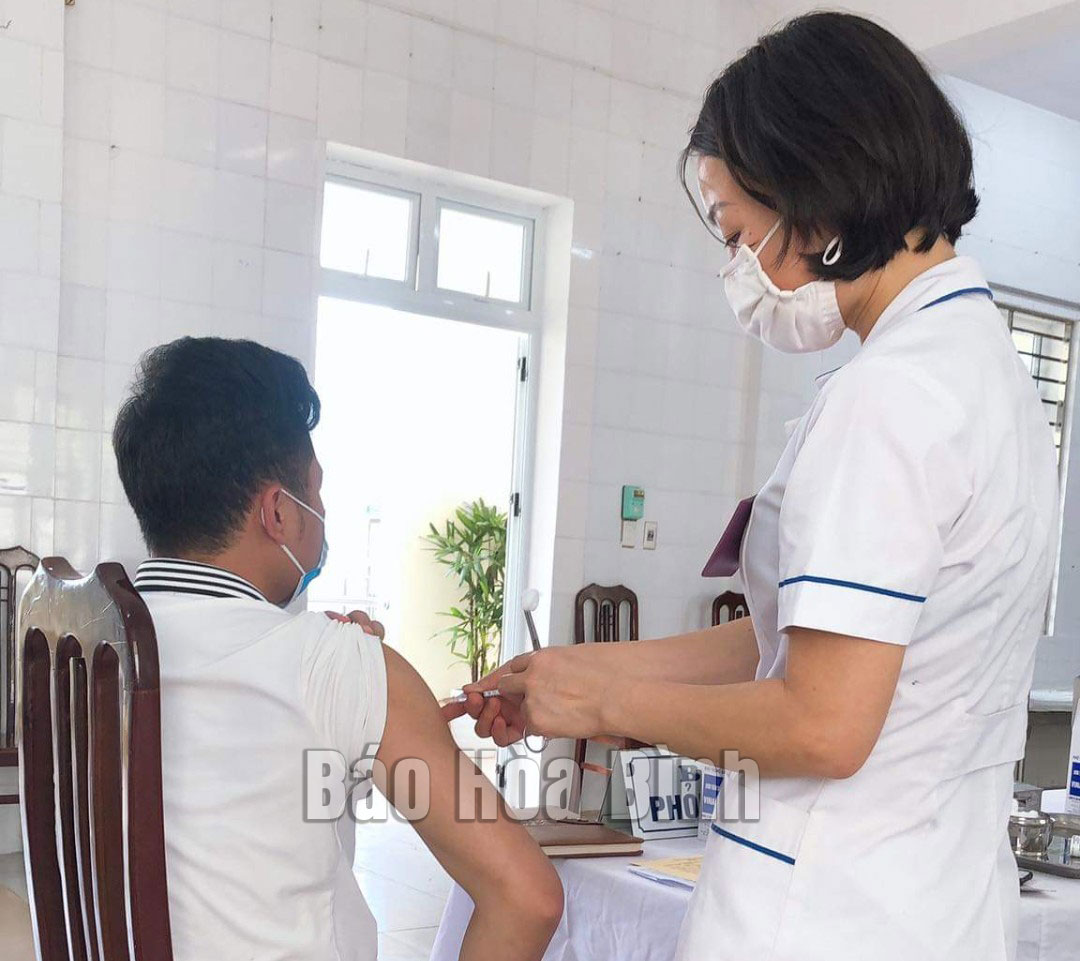
(HBO) - Based on the amount of vaccine of 21,060 doses of Pfizer added by the National Institute of Hygiene and Epidemiology, the Provincial Steering Committee for Covid-19 Prevention and Control issued Decision No. 248 / QD-BCD, dated on December 14, 2021 about distributing Covid-19 vaccine in phase 23.
The officials of the Health Center of Da Bac distict are injecting the people with Covid-19 vaccine.
Accordingly, the vaccine will be added to 8 units, in which: Hoa Binh city will receive 5,386 doses; Tan Lac district will rêcive 2,088 doses; Luong Son will rêcive 1,002 doses; Cao Phong will get 3,702 doses; Kim Boi will get 2,186 doses; Mai Chau will get 2,292 doses; Lac Son will get 2,400 doses; Da Bac will get 2,004 doses.
The Provincial Steering Committee for Covid-19 Prevention and Control requires that the localities receive vaccines and immediately inject the allocated number of Covid-19 vaccines and complete the injectionj as soon as possible. The Department of Health is asigned to direct and guide the medical units so that they can organize safe and effective vaccinations and report the implementation results to the Ministry of Health and the Provincial Steering Committee for Covid-19 prevention and control after completing the injection.
Hoa Binh province is undergoing a dynamic transformation amid Vietnam’s national digital transition. Building on Poliburo’s Resolution No. 57-NQ/TW on breakthroughs in science, technology, innovation, and national digital transformation, the province has rolled out a wide range of practical action plans. A standout initiative is the "Digital Literacy for All” movement, an effort to ensure that no one is left behind in the digital era.
Hoa Binh province is undergoing a dynamic transformation in the wake of the national digital transformation movement. Building on Resolution No. 57-NQ/TW of the Politburo on breakthroughs in science, technology, innovation, and national digital transformation, the province has implemented a wide range of practical action plans. A standout initiative is the "Digital Literacy for All” movement ambitious effort to ensure that no one is left behind in the digital age.
With a spirit of unity and proactive problem-solving, the Party Committee, the government and the people of Dong Lai Commune (Tan Lac District) have made great strides in implementing the resolutions of the 24th Party Congress of the commune for the 2020 - 2025 term. Focusing on leadership and practical actions, the commune has brought the Party’s resolutions into daily life, creating strong impacts and pushing the local development forward.
Amid the nationwide push for digital transformation, young people in Hoa Binh Province are stepping up as dynamic pioneers, applying technology to enhance Youth Union operations and expand the reach of youth-led initiatives. Through creativity and adaptability, Youth Union organizations at all levels have introduced a series of practical solutions, contributing to modern governance and community development.
In recent years, An Nghia commune, located in Lac Son district, has stepped up administrative reform, focusing on improving the quality and efficiency of its single-window service unit for receiving and processing administrative procedures. These improvements have helped create favourable conditions for local residents and organisations to handle administrative procedures, contributing to the commune’s broader socio-economic development.
The Prime Minister-approved master plan to develop the multi-use value of forests ecosystems through 2030, with a vision to 2050, aims to improve the management and sustainable use of forest resources, create jobs, increase incomes, and improve the living standards of ethnic minorities, people in mountainous and remote areas, forest workers and those living near forests.



